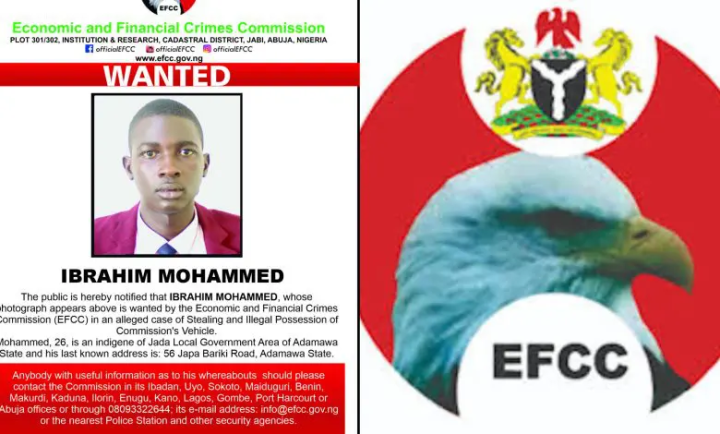The Economic and Financial Crimes Commission (EFCC) has declared Ibrahim Mohammed, a 26-year-old from Adamawa State, wanted in connection with the theft and illegal possession of a vehicle belonging to the anti-graft agency.
This development has sent shockwaves through the public, as the EFCC, which is responsible for tackling corruption and financial crimes in Nigeria, is now a victim of theft within its ranks.
The EFCC’s spokesperson, Dele Oyewale, issued a statement on Friday, confirming that Mohammed is wanted for allegedly stealing one of the commission’s vehicles.

The statement detailed the crime and urged the public to assist in locating the suspect, who remains at large.
Ibrahim Mohammed, an indigene of Jada Local Government Area in Adamawa State, is believed to have committed the theft within a short time frame, raising concerns about the security and internal controls within the EFCC.
The details of how Mohammed gained access to the vehicle remain unclear, but the fact that such an incident could occur within the ranks of Nigeria’s foremost anti-corruption body has raised questions about internal security protocols.
The EFCC’s announcement that one of their vehicles had been stolen came as a surprise to many, as the commission is widely regarded as a highly secure institution.
This incident has also drawn attention to the issue of trust within such government agencies, highlighting the potential for insider threats.
While the EFCC has not disclosed whether Mohammed was a member of staff or someone with access to the commission, the incident has sparked public interest in how the commission plans to address such internal vulnerabilities.
In the official statement, the EFCC called on members of the public to assist in tracking down Ibrahim Mohammed.
The agency urged anyone with information regarding Mohammed’s whereabouts to report it either to the EFCC directly or to the nearest police station.
This appeal for public assistance underscores the seriousness of the case, as the commission seeks to recover the stolen vehicle and bring the perpetrator to justice.
“The public is hereby notified that Ibrahim Mohammed is wanted by the Economic and Financial Crimes Commission (EFCC) in an alleged case of stealing and illegal possession of the commission’s vehicle,” the EFCC’s statement read.
Such appeals for public assistance are a regular feature in high-profile investigations, but the fact that this involves the theft of a government vehicle adds a level of urgency and importance to the case.
The EFCC’s reliance on public cooperation highlights the challenges that law enforcement agencies face in locating suspects who are often able to evade detection by blending into the general population.
The theft of an EFCC vehicle by an individual allegedly linked to the commission has raised several concerns about the internal security measures in place within the agency.
As one of the leading anti-corruption bodies in Nigeria, the EFCC is responsible for investigating and prosecuting financial crimes, including fraud, money laundering, and embezzlement.
It is therefore alarming that the agency has fallen victim to such a crime, particularly one that involves the theft of its own property.
This incident brings to light the need for stricter security protocols and more thorough vetting procedures for individuals who have access to the EFCC’s assets.
While the commission is known for its efficiency in handling external threats, this case reveals the potential for internal breaches that could undermine its credibility.
To prevent future occurrences, the EFCC will likely need to review its internal controls and implement stronger safeguards against such thefts.
Moreover, the case of Ibrahim Mohammed raises the issue of accountability within government agencies.
As the EFCC continues its search for the suspect, it must also address the underlying factors that allowed such a breach to occur.
Strengthening security policies, enhancing surveillance, and conducting regular audits of assets will be essential in ensuring that the EFCC remains a robust institution capable of safeguarding its resources.
The public reaction to the EFCC’s announcement has been mixed.
While many Nigerians have expressed shock that such a high-profile agency could fall victim to theft, others see it as a reflection of the broader challenges facing government institutions in the country.
Corruption and internal misconduct within public offices have long been a problem in Nigeria, and this incident has served as a reminder of the need for continuous reforms.
On social media, reactions have ranged from disbelief to frustration.
Some have questioned how someone could steal a vehicle from a highly secured agency, while others have called for an overhaul of security systems within all government bodies.
The case has also led to discussions about the broader issue of corruption and the role that insider threats can play in undermining the integrity of key institutions.
As the EFCC intensifies its search for Ibrahim Mohammed, it is likely that further details about the theft will emerge.
Whether Mohammed acted alone or in collaboration with others, the case has highlighted the vulnerabilities that even top-tier government agencies face.
The commission’s swift action in declaring the suspect wanted and seeking public assistance is a positive step towards ensuring that justice is served.
The EFCC’s reputation as Nigeria’s primary anti-corruption body remains intact, but this incident serves as a wake-up call.
Strengthening internal security measures, fostering a culture of accountability, and ensuring that such breaches do not recur will be crucial for the EFCC moving forward.
In conclusion, the theft of an EFCC vehicle by Ibrahim Mohammed has sparked a nationwide manhunt and raised important questions about internal security within Nigeria’s government agencies.
As the public continues to monitor developments, the hope is that the suspect will be apprehended soon, and the commission will take the necessary steps to prevent future incidents of this nature.
Support InfoStride News' Credible Journalism: Only credible journalism can guarantee a fair, accountable and transparent society, including democracy and government. It involves a lot of efforts and money. We need your support. Click here to Donate
